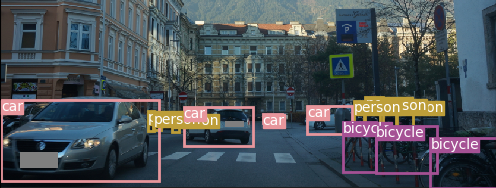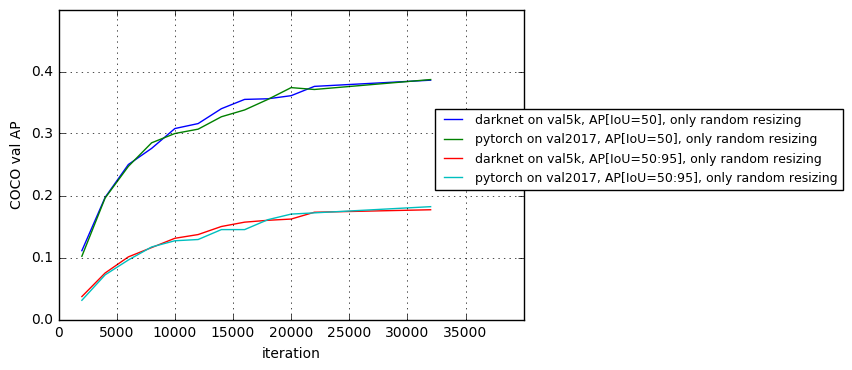YOLOv3 in Pytorch
Pytorch implementation of YOLOv3
What's New
- 19/02/12 verified inference COCO AP [IoU=0.50:0.95] = 0.297 with val2017, 416x416, batchsize = 8 and w/o random distortion
- 18/11/27 COCO AP results of darknet (training) are reproduced with the same training conditions
- 18/11/20 verified inference COCO AP [IoU=0.50:0.95] = 0.302 (paper: 0.310), val5k, 416x416
- 18/11/20 verified inference COCO AP [IoU=0.50] = 0.544 (paper: 0.553), val5k, 416x416
Performance
| Original (darknet) | Ours (pytorch) | |
| COCO AP[IoU=0.50:0.95], inference | 0.310 | 0.302 |
| COCO AP[IoU=0.50], inference | 0.553 | 0.544 |
| COCO AP[IoU=0.50:0.95], training | 0.310 | 0.297(*) |
| COCO AP[IoU=0.50], training | 0.553 | 0.506(*) |
(*) results with batchsize = 8 and w/o random distortion
Also, the results with batchsize = 4 and with random distortion will be updated soon.
We have verified that COCO val results of darknet are reproduced in the condition where only random resizing is used:
Installation
Requirements
- Python 3.6+
- Numpy (verified as operable: 1.15.2)
- OpenCV
- Matplotlib
- Pytorch (verified as operable: v0.4.0, v1.0.0)
- Cython (verified as operable: v0.29.1)
- pycocotools (verified as operable: v2.0.0)
- Cuda (verified as operable: v9.0)
optional:
- tensorboard (>1.7.0)
- tensorboardX
- CuDNN (verified as operable: v7.0)
Docker Environment
We provide a Dockerfile to build an environment that meets the above requirements.
# build docker image
$ nvidia-docker build -t yolov3-in-pytorch-image --build-arg UID=`id -u` -f docker/Dockerfile .
# create docker container and login bash
$ nvidia-docker run -it -v `pwd`:/work --name yolov3-in-pytorch-container yolov3-in-pytorch-image
docker@4d69df209f4a:/work$ python train.py --helpDownload pretrained weights
download the pretrained file from the author's project page:
$ mkdir weights
$ cd weights/
$ bash ../requirements/download_weights.shCOCO 2017 dataset:
the COCO dataset is downloaded and unzipped by:
$ bash requirements/getcoco.shInference with Pretrained Weights
To detect objects in the sample image, just run:
$ python demo.py --image data/mountain.png --detect_thresh 0.5 --weights_path weights/yolov3.weightsTo run the demo using the non-interactive backend, add --background .
Train
$ python train.py --help
usage: train.py [-h] [--cfg CFG] [--weights_path WEIGHTS_PATH] [--n_cpu N_CPU]
[--checkpoint_interval CHECKPOINT_INTERVAL]
[--eval_interval EVAL_INTERVAL] [--checkpoint CHECKPOINT]
[--checkpoint_dir CHECKPOINT_DIR] [--use_cuda USE_CUDA]
[--debug] [--tfboard TFBOARD]
optional arguments:
-h, --help show this help message and exit
--cfg CFG config file. see readme
--weights_path WEIGHTS_PATH
darknet weights file
--n_cpu N_CPU number of workers
--checkpoint_interval CHECKPOINT_INTERVAL
interval between saving checkpoints
--eval_interval EVAL_INTERVAL
interval between evaluations
--checkpoint CHECKPOINT
pytorch checkpoint file path
--checkpoint_dir CHECKPOINT_DIR
directory where checkpoint files are saved
--use_cuda USE_CUDA
--debug debug mode where only one image is trained
--tfboard TFBOARD tensorboard path for loggingexample:
$ python train.py --weights_path weights/darknet53.conv.74 --tfboard logThe train configuration is written in yaml files located in config folder. We use the following format:
MODEL:
TYPE: YOLOv3
BACKBONE: darknet53
ANCHORS: [[10, 13], [16, 30], [33, 23],
[30, 61], [62, 45], [59, 119],
[116, 90], [156, 198], [373, 326]] # the anchors used in the YOLO layers
ANCH_MASK: [[6, 7, 8], [3, 4, 5], [0, 1, 2]] # anchor filter for each YOLO layer
N_CLASSES: 80 # number of object classes
TRAIN:
LR: 0.001
MOMENTUM: 0.9
DECAY: 0.0005
BURN_IN: 1000 # duration (iters) for learning rate burn-in
MAXITER: 500000
STEPS: (400000, 450000) # lr-drop iter points
BATCHSIZE: 4
SUBDIVISION: 16 # num of minibatch inner-iterations
IMGSIZE: 608 # initial image size
LOSSTYPE: l2 # loss type for w, h
IGNORETHRE: 0.7 # IoU threshold for learning conf
AUGMENTATION: # data augmentation section only for training
RANDRESIZE: True # enable random resizing
JITTER: 0.3 # amplitude of jitter for resizing
RANDOM_PLACING: True # enable random placing
HUE: 0.1 # random distortion parameter
SATURATION: 1.5 # random distortion parameter
EXPOSURE: 1.5 # random distortion parameter
LRFLIP: True # enable horizontal flip
RANDOM_DISTORT: False # enable random distortion in HSV space
TEST:
CONFTHRE: 0.8 # not used
NMSTHRE: 0.45 # same as official darknet
IMGSIZE: 416 # this can be changed to measure acc-speed tradeoff
NUM_GPUS: 1
Evaluate COCO AP
$ python train.py --cfg config/yolov3_eval.cfg --eval_interval 1 [--ckpt ckpt_path] [--weights_path weights_path]TODOs
- Precision Evaluator (bbox, COCO metric)
- Modify the target builder
- Modify loss calculation
- Training Scheduler
- Weight initialization
- Augmentation : Resizing
- Augmentation : Jitter
- Augmentation : Flip
- Augmentation : Random Distortion
- Add the YOLOv3 Tiny Model
Paper
YOLOv3: An Incremental Improvement
Joseph Redmon, Ali Farhadi
[Paper] [Original Implementation] [Author's Project Page]
Credit
@article{yolov3,
title={YOLOv3: An Incremental Improvement},
author={Redmon, Joseph and Farhadi, Ali},
journal = {arXiv},
year={2018}
}


